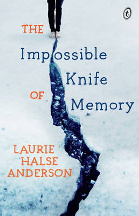The Impossible Knife of Memory by Laurie Halse Anderson

Text Publishing, 2014. ISBN 9782922182227
(Age: 14+) Highly recommended. Post traumatic stress disorder,
Returned soldiers, Homelessness, Alcohol and drugs. I read this book
in late 2013, and the more I think about it the more I see it as a
class set for middle secondary, as it brings in many issues relevant
to teens today. Seventeen year old Hayley is not your usual school
kid, she often truants for no reason, and is surly and often
uncooperative. So when she is sent to the student counsellor after
seven detentions, she is forced to agree to see her for a session.
The counsellor makes Hayley sit up and take notice with two pieces
of information, one that her father has not been at work for months
and the second that her stepmother has been in touch with the
school.
She rushes off to find her father, and talks Finn into driving her.
She finds the man at their home, his mother's house where they have
finally settled after many years of wandering, trying to avoid her
stepmother and the authorities.
She finds a broken man, one suffering from delusions and anxiety,
taking to alcohol and drugs to ease the pain of his life, unable to
hold down a job. Hayley watches out for him like a mother hen, but
she needs to start to look out for herself.
We find that her father's experiences in war have left him suffering
depression, anxiety and paranoia. He is unable to settle to things,
sleeps badly, waking from nightmares for which alcohol is the only
antidote. Both he and Hayley have rebuffed all attempts to help them
and run away from Grace Hayley's stepmother. Some of his old army
buddies call by and stay the weekend reminiscing about old times,
but he has a psychotic episode and kicks them out.
The two characters are beautifully drawn; the one suffering from
post traumatic stress, descending into paranoia and seclusion, while
she does all she can to protect him. He sees Hayley as a young girl
still, one needing a protective father who controls her moves. The
author shows this vividly when the man takes a swipe at the even
tempered Finn who has driven Hayley home. But Hayley too suffers
trauma. She cannot see the past clearly, and we see the events
through her eyes, and her recollection is muddy.
A crisis occurs in which both father and daughter see no way out but
suicide: he goes to the cliff near the town, she has some pills that
Grace has given her for sleeping. Both people are at the end of
their tether, and readers will read on to see how the pair survives
their ordeal.
This great read includes a number of topical themes; post traumatic
stress disorder, truanting, homeless, effects of war, the role of
step parents, the role of a school, and so on. With a class these
themes would engender some great discussions, including the
structure of a novel when the narrator is telling her version of the
truth which does not entirely connect with reality and so is
unreliable.
Fran Knight